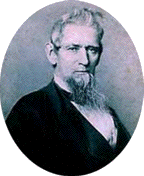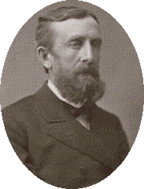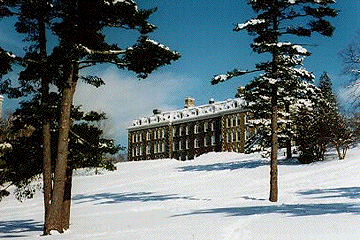October 7: Religion and Cornell University
Cornell University Founded (1865)
It was on this date, October 7, 1865, that US businessman Ezra Cornell, and respected scholar Andrew Dickson White, chartered and founded the Ivy League University in Ithaca, New York, known as Cornell. "Uncle Ezra," as he is affectionately known on campus, had a vision: "I would found an institution where any person can find instruction in any study." Consequently, students were admitted regardless of sex or religion.
Indeed, Cornell University was a rarity in the United States at the time: it was, by explicit design, not affiliated with any religious organization. Co-founder and first college president Andrew Dickson White was an academic with a keen interest in, and scholarly credentials for investigating, the History of the Warfare of Science with Theology in Christendom. Indeed, he wrote a two-volume study on the question that was published in 1895.
With an academic's clear-eyed reason he argued in Warfare that theological attacks on the progress and human benefits of science promulgate "the direst evils both to religion and to science." A religion-free education was not a popular idea in 19th century America. The founding of Cornell was greeted with hostile accusations of Darwinism and Atheism. White was a practicing Episcopalian, but he also supported evolution – he devoted the first chapter of Warfare to describing its triumph over the biblical story of creation – and aimed to purge theology of its antiscientific bias.
It was Christian theology in the first place that dismantled the universal pagan education system under the old Roman Empire, and did so little during the thousand years of absolute Christian domination of Europe that more than ninety percent of the people in every Christian nation were illiterate and densely ignorant. Only now, when modern secular school systems have raised the learning and prosperity of Western civilization, do churches want to take credit for having been supporters of education all along!
Cornell University's founding documents state their aim categorically: "[A]t no time shall a majority of [the trustees] be of one religious sect, or of no religious sect," and "persons of every religious denomination, or of no religious denomination, shall be equally eligible to all offices and appointments." White had faith in a God "wise enough to make all truth-seeking safe, and good enough to make all truth-telling useful."
If there were any doubt about the founding principles of Cornell University, we have the very words of the founder. In a letter dated May 15, 1873, addressed "To the Coming man & woman," Ezra Cornell writes,
On the occasion of laying the corner stone of the Sage College for women of Cornell University, I desire to say that the principle [sic] danger, and I say almost the only danger I see in the future to be encountered by the friends of education, and by all lovers of true liberty is that which may arise from sectarian strife.
From these halls, sectarianism must be forever excluded, all students must be left free to worship God, as their concience [sic] shall dictate, and all persons of any creed or all creeds must find free and easy access, and a hearty and equal welcome, to the educational facilities possessed by the Cornell University.
Coeducation of the sexes and entire freedom from sectarian or political preferences is the only proper and safe way for providing an education that shall meet the wants of the future and carry out the founders' idea of an Institution where "any person can find instruction in any study." I herewith commit this great trust to your care.*
Echoing that sentiment in our own day, Cornell Library official H. Thomas Hickerson said, "Cornell's perspective regarding the role of religion in public education was rather like that of the founding fathers' regarding religion and government. He thought it should be kept separate."
* All is not perfectly secular at Cornell: "the [Religious Studies] program," says the college website, "offers an opportunity to acquire a fuller understanding and appreciation of one of the most fundamental aspects of human thought and behavior." As the study of humanity’s greatest folly, it seems superstitions and false assumptions die hard!
Originally published October 2003 by Ronald Bruce Meyer.




